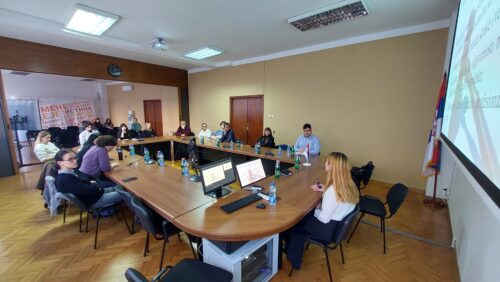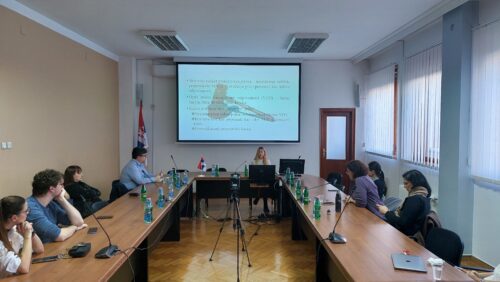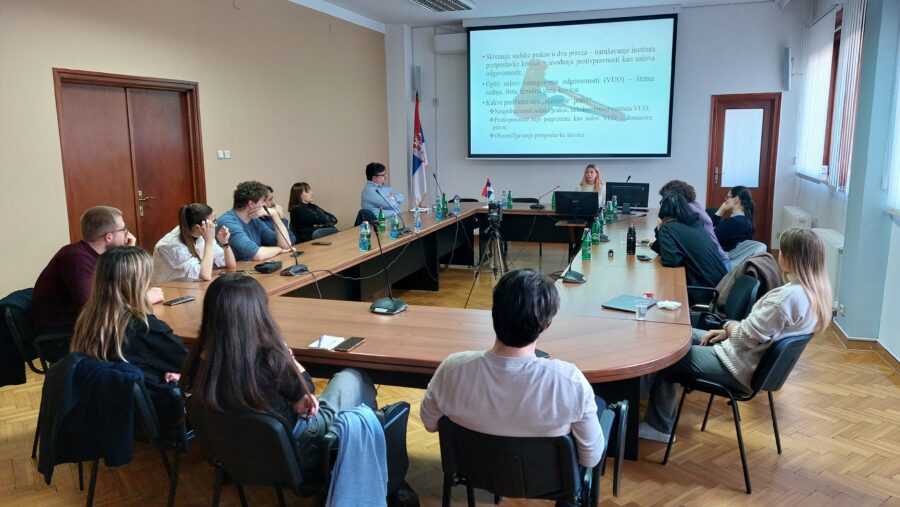Professionals such as doctors are increasingly at the center of judicial practice that subtly reshapes the domain of civil liability. This trend, which introduces wrongfulness as a separate condition of liability while simultaneously undermining the concept of the presumption of civil fault, was highlighted by Petra Stanojević, Junior Research Assistant at the Centre for Legal Research of the Institute of Social Sciences.
The lecture addressed the issue of civil liability of holders of regulated professions, primarily doctors, arising from damage caused during and in connection with the exercise of their profession. Since this type of liability is not specifically regulated, the general provisions of the Law on Obligations regarding subjective non-contractual liability apply. According to these provisions, the conditions for liability include the existence of damage, a causal link, and fault, with the presumption of fault generally operating.
However, as emphasized in the lecture, the difficulties courts face in determining the standard of professional fault have led to the development of judicial practice that departs from existing principles in two respects: it introduces wrongfulness as a separate condition of liability and undermines the idea of the presumption of civil fault. The inconsistency of case law is particularly evident in proceedings concerning the professional liability of individuals from whom society expects expertise and heightened diligence.
In medical malpractice cases, courts invariably require proof of a medical error—either in the form of a wrongful act or as an additional condition of liability. In both instances, the cumulative existence of error and fault is required. Courts rely on the definition of professional error provided by the Health Care Act, which includes two elements: failure to apply medical standards and lack of due diligence in action.
Lack of due diligence in disciplinary proceedings, for which this definition was originally established, is a concept borrowed from criminal law. However, its application in civil law for the purpose of determining non-contractual liability requires adapting the notion of fault to the nature of civil liability. Consequently, lack of due diligence is viewed objectively, as a deviation from the conduct expected of a doctor, and the concept of medical error thereby encompasses fault.
According to the rules on the burden of proof prescribed by the Law on Civil Procedure, each party must prove the facts it relies upon. This means that the plaintiff bears the burden of proving the wrongful act, the damage, and the causal link. When the wrongful act is equated with medical error, the plaintiff must also prove the existence of such an error. On the other hand, the introduction of wrongfulness as a separate condition of liability for holders of regulated professions arises primarily from the specific nature of professional knowledge and skills that judges, by definition, do not possess. Consequently, courts often turn to subsidiary sources in order to render appropriate judgments.
The analysis of case law and accompanying theoretical interpretations indicates that the nature of non-contractual liability in the actions of holders of regulated professions is being undermined. The practical consequences of such a trend include the worsening procedural position of injured parties, the mitigation of the liability of professionals, the distortion of the nature of subjective liability for damage, and the erosion of the presumption of fault as a fundamental civil law concept.
The lecture by Petra Stanojević was organized as part of the cycle of presentations of research by newly joined colleagues at the Institute of Social Sciences.



